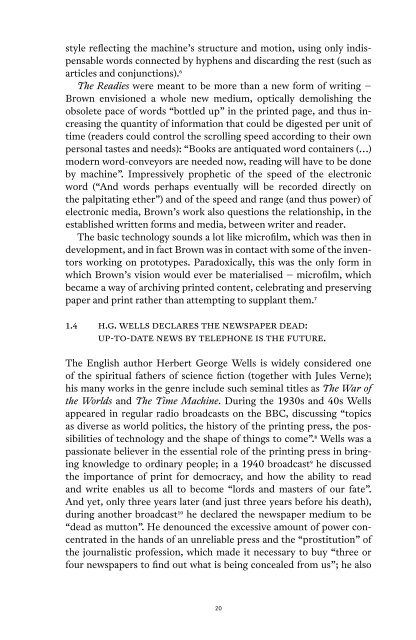Post- Digital Print - Monoskop
Post- Digital Print - Monoskop
Post- Digital Print - Monoskop
Create successful ePaper yourself
Turn your PDF publications into a flip-book with our unique Google optimized e-Paper software.
style reflecting the machine’s structure and motion, using only indispensable<br />
words connected by hyphens and discarding the rest (such as<br />
articles and conjunctions). 6<br />
The Readies were meant to be more than a new form of writing –<br />
Brown envisioned a whole new medium, optically demolishing the<br />
obsolete pace of words “bottled up” in the printed page, and thus increasing<br />
the quantity of information that could be digested per unit of<br />
time (readers could control the scrolling speed according to their own<br />
personal tastes and needs): “Books are antiquated word containers (…)<br />
modern word-conveyors are needed now, reading will have to be done<br />
by machine”. Impressively prophetic of the speed of the electronic<br />
word (“And words perhaps eventually will be recorded directly on<br />
the palpitating ether”) and of the speed and range (and thus power) of<br />
electronic media, Brown’s work also questions the relationship, in the<br />
established written forms and media, between writer and reader.<br />
The basic technology sounds a lot like microfilm, which was then in<br />
development, and in fact Brown was in contact with some of the inventors<br />
working on prototypes. Paradoxically, this was the only form in<br />
which Brown’s vision would ever be materialised – microfilm, which<br />
became a way of archiving printed content, celebrating and preserving<br />
paper and print rather than attempting to supplant them. 7<br />
1.4 h.g. wells declares the newspaper dead:<br />
up-to-date news by telephone is the future.<br />
The English author Herbert George Wells is widely considered one<br />
of the spiritual fathers of science fiction (together with Jules Verne);<br />
his many works in the genre include such seminal titles as The War of<br />
the Worlds and The Time Machine. During the 1930s and 40s Wells<br />
appeared in regular radio broadcasts on the BBC, discussing “topics<br />
as diverse as world politics, the history of the printing press, the possibilities<br />
of technology and the shape of things to come”. 8 Wells was a<br />
passionate believer in the essential role of the printing press in bringing<br />
knowledge to ordinary people; in a 1940 broadcast 9 he discussed<br />
the importance of print for democracy, and how the ability to read<br />
and write enables us all to become “lords and masters of our fate”.<br />
And yet, only three years later (and just three years before his death),<br />
during another broadcast 10 he declared the newspaper medium to be<br />
“dead as mutton”. He denounced the excessive amount of power concentrated<br />
in the hands of an unreliable press and the “prostitution” of<br />
the journalistic profession, which made it necessary to buy “three or<br />
four newspapers to find out what is being concealed from us”; he also<br />
20

















